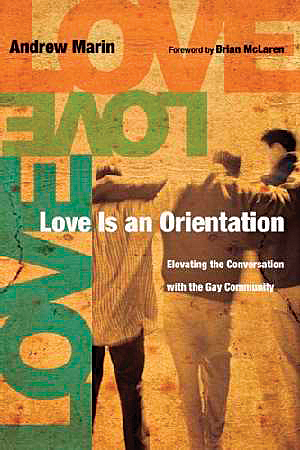 While a university student, Andrew Marin discovered that three of his best friends were gay. As a conservative evangelical Christian and self-confessed “homophobe,” he was shocked and confused. He felt God prompting him to seek truth through relationship instead of running from his friends who had confided in him. God led Marin on a journey of discovery and love as he developed friendships with those he once rejected. He moved to a predominantly gay, lesbian, bisexual and transgender (referred to as GLBT) neighbourhood and developed The Marin Foundation, which aims to build bridges between the GLBT community and the Church.
While a university student, Andrew Marin discovered that three of his best friends were gay. As a conservative evangelical Christian and self-confessed “homophobe,” he was shocked and confused. He felt God prompting him to seek truth through relationship instead of running from his friends who had confided in him. God led Marin on a journey of discovery and love as he developed friendships with those he once rejected. He moved to a predominantly gay, lesbian, bisexual and transgender (referred to as GLBT) neighbourhood and developed The Marin Foundation, which aims to build bridges between the GLBT community and the Church.
Marin's purpose in writing Love Is an Orientation is to challenge how the evangelical Church thinks about and relates to gay and lesbian people. He writes frankly from his experiences in “Boystown” in Chicago, giving personal anecdotes and sharing some of his friends' testimonies. Marin broaches issues of sexual identity, the history of evangelical/GLBT relations and outlines the gay church's interpretations of Scripture that refer to homosexuality, believing he can best represent Jesus by first understanding what gay Christians believe.
The author asserts that “the Christian community has only ever known one way to handle same-sex sexual behaviour: take a stand and keep a distance.” He doesn't expect all Christians to live in GLBT neighbourhoods, but he does want to see two divergent communities working together for the gospel. Marin introduces some practical ways we can move forward despite a history of hate and debate. He hopes that his readers will use his principles for more constructive conversation and build foundations and bridges where they have not previously existed.
Marin offers a fresh perspective on a topic that many Christians probably shy away from. He does not attempt to change anyone's theological views or condone same-sex sexual behaviour, but seeks to direct us back to an orientation of love that is rooted in Jesus. Says Marin: “We're called by Christ to be different by being loving—by choosing humility over hostility, by braving the unknown rather than huddling in safe enclaves, by daring to face people whom we've offended and who have offended us, and inviting them into a reconciled relationship with God and one another.”









It is true that we must no longer identify with the sin from which we have been saved.
We must also remember that Jesus loved the sinner and hated the sin. It is a difficult thing to do and only asking Him to put His love for the sinner within our heats so that we can love the sinner with His love is it even possible to follow His example. Jesus certainly abhors sin, since He is God and God abhors sin. However, His name is forever associated with sin since He died to save us from sin.
As for me, I am a sinner saved by grace. Hallelujah! This truth changes the way I look at other sinners, by they saved by grace or unsaved. I cannot judge them or heap contempt upon them. How could I? I AM a sinner, first and foremost, and the more purifying work God does in me, the more I see how totally depraved I am! There is NO good within me except where God has cleansed me. The Salvation Army happens to agree with me doctrinally.
Thank God Jesus associated with sinners! If He didn't, I would be forever damned. Praise His holy and glorious name!